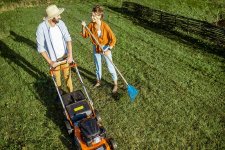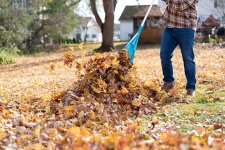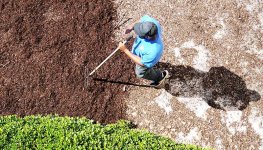This article will cover various aspects of this debate, including the benefits of mulching leaves, the process of mulching with a mower, the effectiveness of mulched leaves as fertilizer, and the impact of not raking leaves. Additionally, it will explore common questions such as whether mulching leaves can kill grass, whether to rake mulch or not, and the effectiveness of using a cyclone rake for mulching. By the end of this article, readers will have a better understanding of the pros and cons of raking and mulching leaves and which option may be best suited for their specific needs.
Mulching vs Raking Leaves: Is it better to mow leaves or rake and bag leaves?
The ongoing debate among gardeners over whether to mulch or rake and bag leaves largely depends on personal preference and the desired outcome. Raking leaves can provide a cleaner and more pristine appearance to the lawn, and allows for more precise control over the removal of leaves and debris, which can help prevent damage to grass and other vegetation. Mulching leaves, on the other hand, can provide valuable nutrients to the soil and plants as the leaves decompose. Mulching also helps retain moisture and prevent erosion, benefiting the overall health of the lawn. However, mulching may not provide as clean of a look as raking and can potentially create build-up if not done correctly. Ultimately, the decision to mulch or rake leaves depends on personal preference, the needs of the lawn, and the time and resources available. Mulching leaves with a lawn mower can reduce waste, provide nutrients to the soil, and act as a natural fertilizer, promoting healthy growth and preventing the need for chemical fertilizers.
Do you rake the leaves into a pile and then get rid of them or mulch them right down into the ground?
Raking leaves has become a customary activity for many homeowners during autumn. However, determining the best way to dispose of the leaves can be a daunting task. Some homeowners choose to rake the leaves into a pile and then get rid of them, while others opt to mulch them right down into the ground. Raking and bagging leaves can be a time-consuming and labor-intensive process. Therefore, mulching could be an efficient and cost-effective solution. Mulching leaves instead of disposing of them has many advantages, including reducing waste, promoting healthier soil, and saving time and money. Mulched leaves will eventually break down and add valuable nutrients to the soil. Additionally, the mulch layer will help to retain moisture, prevent weeds from growing, and regulate soil temperature. Therefore, rather than bagging leaves, mulching can be an eco-friendly and convenient alternative.
How Do I Mulch Leaves With a Mower?
Mulching leaves with a mower is a great way to transform yard waste into a nutrient-rich source for your lawn. The process is straightforward: attach a mulching blade to your mower, set the mower to a higher height, and mow over the leaves. The blade shreds the leaves and deposits them back onto the lawn, where they will break down over time and add nutrients to the soil. It's essential to make sure the leaves are dry before mulching them to prevent clumping and clogging the mower's blades. Additionally, you may need to make several passes over the leaves to ensure they are adequately shredded. Mulching leaves with a mower not only helps the lawn but also saves time, money, and effort compared to raking and bagging leaves.Do mulched leaves make good fertilizer?
Mulching leaves is an effective way to turn organic matter into nutrient-rich soil. Mulched leaves decompose quickly, adding both nitrogen and carbon to the soil, which helps to prevent erosion, retain moisture, and suppress weeds. As the leaves break down, they release essential minerals and nutrients into the soil, such as calcium, magnesium, and potassium, which are vital for plant growth. Mulched leaves also serve as a natural mulch, insulating the soil against extreme temperatures and preserving soil moisture, which reduces the amount of water required for irrigation. By using mulched leaves as fertilizer, gardeners and farmers can increase soil fertility, save money, and protect the environment. However, it is important to note that mulched leaves may not provide all the nutrients necessary for optimal plant growth, and other sources of fertilizers may be required to supplement the soil.Is mulching leaves good for the lawn?
Mulching leaves can be an excellent way to promote lawn health and vitality. When you mulch leaves, they break down and provide essential nutrients to the soil, including nitrogen, phosphorus, and potassium. These nutrients are essential for healthy plant growth, and mulching leaves can help reduce the need for chemical fertilizers. Additionally, mulching leaves can improve soil quality by increasing organic matter and improving soil structure. By providing a layer of protection over the soil, mulched leaves can also help retain moisture and prevent soil erosion. This can be especially important in areas with sandy soils or where there is a lot of foot traffic.What happens if you don’t rake your leaves?
If you don't rake your leaves, they can accumulate on your lawn and cause several problems. First, leaves can block sunlight from reaching the grass, inhibiting its growth and causing it to weaken over time. Additionally, leaves can trap moisture on the grass, leading to the growth of fungi and other diseases. As the leaves decompose, they can also release harmful gases, such as carbon dioxide and methane, which can harm the environment. Finally, un-raked leaves can create a breeding ground for pests, such as mice and other rodents, which can cause damage to your lawn and garden.Should you rake them up now or wait until the limbs are bare?
Whether you should rake leaves now or wait until the limbs are bare depends on several factors, including the size of your lawn, the amount of leaves you have, and your personal preferences.Does a cyclone rake mulch?
Yes, the Cyclone Rake is capable of mulching leaves and other debris. The machine is equipped with a powerful vacuum that efficiently collects and shreds leaves, grass, twigs, and other lawn and garden debris into small pieces, which can be used as mulch or compost material. The Cyclone Rake comes with a unique dual-stage shredding system that crumbles and shreds leaves before they enter the hopper. This makes the mulch produced by the machine finer, denser, and more efficient for use in gardens and landscaping. Mulching is an excellent way to reduce waste, conserve water, prevent soil erosion and suppress weed growth, and the Cyclone Rake makes it easy and convenient to do so while also keeping your lawn and garden tidy and well-maintained.Will mulching leaves kill grass?
Mulching leaves will not kill grass, as long as it is done properly. When mulching leaves, it is important to shred them into small pieces so that they can decompose more quickly and efficiently. If you leave large clumps of leaves on your lawn, they can block sunlight and prevent air and moisture from reaching the grass, leading to yellowing and possibly even death. However, if you mulch your leaves into small pieces and spread them evenly over the lawn, they can provide essential nutrients to the soil and promote healthy growth.Should you rake mulch?
Mulch is a crucial component of gardening, as it helps retain moisture in the soil, moderates soil temperature, and suppresses weeds. However, many gardeners wonder whether they should rake their mulch. The answer is no, you should not rake mulch. While it may seem like a good idea to keep your garden tidy, raking mulch can actually damage the soil structure and remove the beneficial benefits. Raking the mulch can also expose your garden soil to sunlight and lead to evaporation, which means that your soil loses moisture more quickly. Furthermore, raking mulch can disrupt the natural ecosystem in your garden, removing valuable microorganisms and disturbing the beneficial insects that live within the mulch layer. Therefore, it is best to let the mulch remain undisturbed and decompose naturally. However, if you need to remove debris, pick them up by hand and avoid disturbing the mulch layer.
Conclusion: Should I Rake or Mulch My Leaves?
Whether you should rake or mulch your leaves depends on several factors, including the amount of leaves you have, the size of your lawn, and your personal preferences. Raking leaves can be a good option if you have a small lawn with a manageable amount of leaves. This can be a good way to collect leaves for composting or to dispose of them elsewhere. However, raking leaves can be time-consuming and labor-intensive, especially if you have a large lawn or a lot of leaves. Mulching leaves can be a good option if you want to save time and money while providing essential nutrients to your lawn. Additionally, mulched leaves can act as a natural fertilizer, promoting healthy growth and preventing the need for chemical fertilizers.
Last edited by a moderator:
